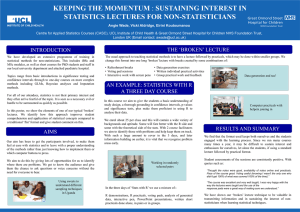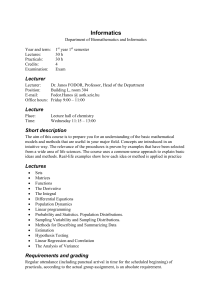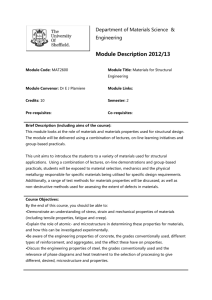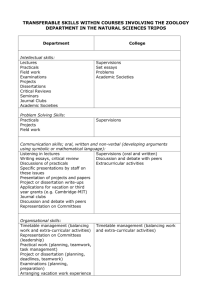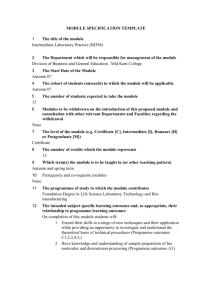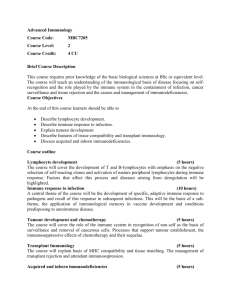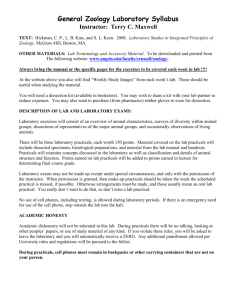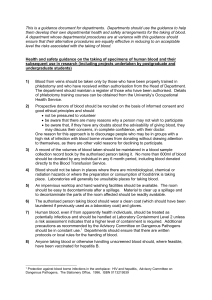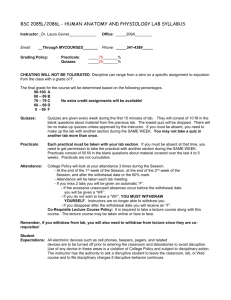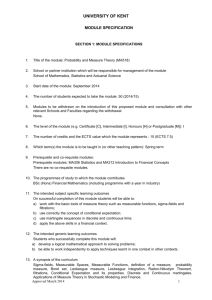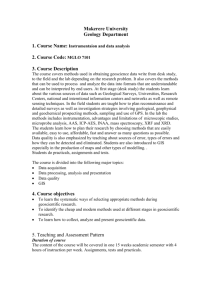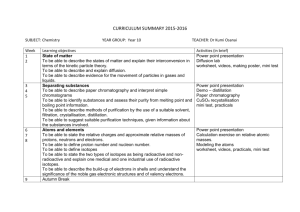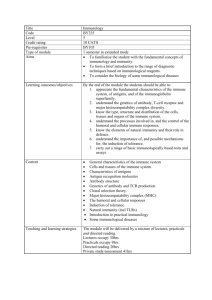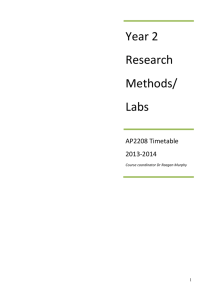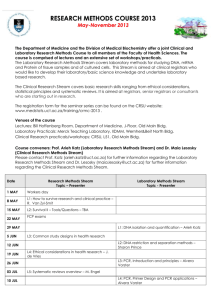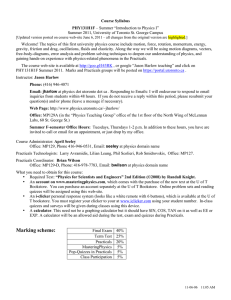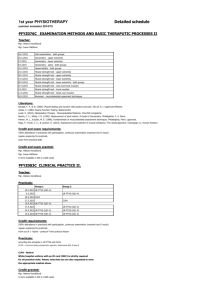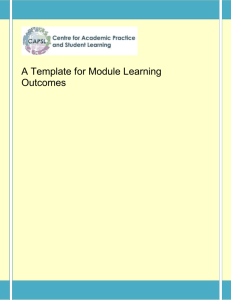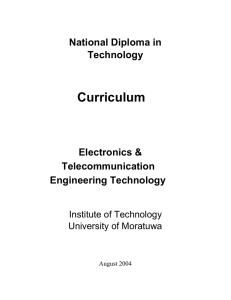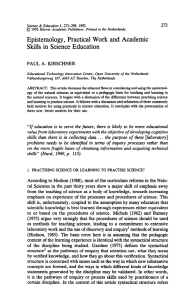MODULE SPECIFICATION TEMPLATE
advertisement
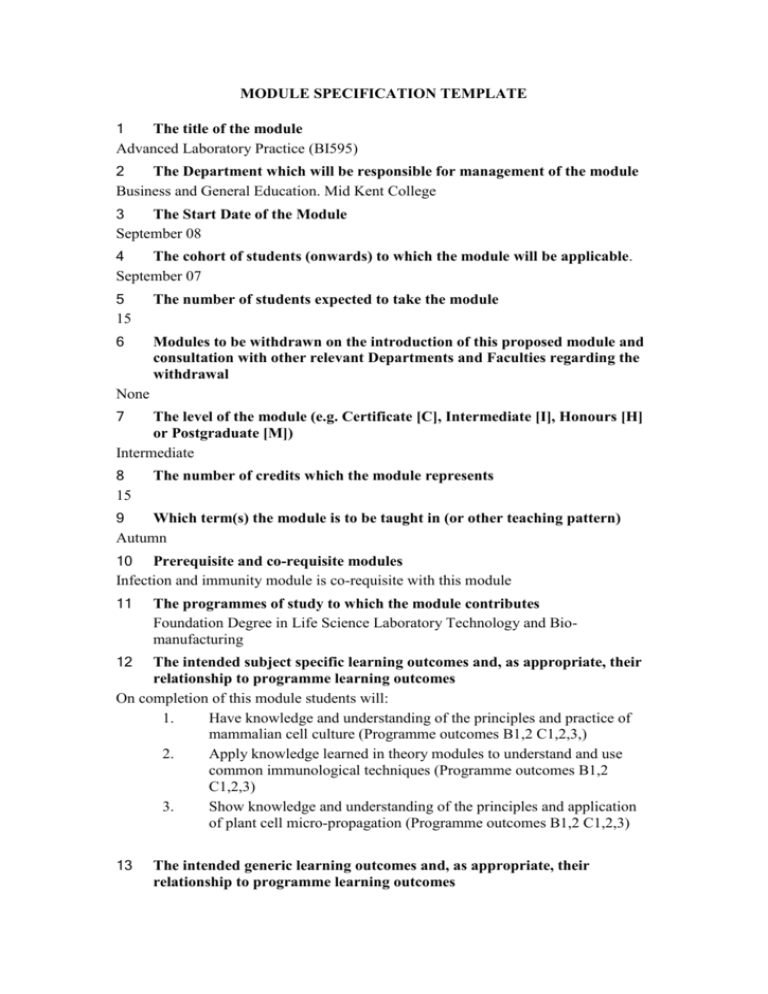
MODULE SPECIFICATION TEMPLATE 1 The title of the module Advanced Laboratory Practice (BI595) 2 The Department which will be responsible for management of the module Business and General Education. Mid Kent College 3 The Start Date of the Module September 08 4 The cohort of students (onwards) to which the module will be applicable. September 07 5 The number of students expected to take the module 15 6 Modules to be withdrawn on the introduction of this proposed module and consultation with other relevant Departments and Faculties regarding the withdrawal None 7 The level of the module (e.g. Certificate [C], Intermediate [I], Honours [H] or Postgraduate [M]) Intermediate 8 The number of credits which the module represents 15 9 Which term(s) the module is to be taught in (or other teaching pattern) Autumn 10 Prerequisite and co-requisite modules Infection and immunity module is co-requisite with this module 11 The programmes of study to which the module contributes Foundation Degree in Life Science Laboratory Technology and Biomanufacturing 12 The intended subject specific learning outcomes and, as appropriate, their relationship to programme learning outcomes On completion of this module students will: 1. Have knowledge and understanding of the principles and practice of mammalian cell culture (Programme outcomes B1,2 C1,2,3,) 2. Apply knowledge learned in theory modules to understand and use common immunological techniques (Programme outcomes B1,2 C1,2,3) 3. Show knowledge and understanding of the principles and application of plant cell micro-propagation (Programme outcomes B1,2 C1,2,3) 13 The intended generic learning outcomes and, as appropriate, their relationship to programme learning outcomes 1. To provide students with the knowledge and ability to improve and further develop their theoretical knowledge and practical skills 2. To enable students to synthesise information from practical investigations in order to consolidate their understanding of theory and practice 3. To enable students to utilise problem solving skills 4. To provide students with the opportunity to manage projects by prioritising workloads and managing resources This module fulfils all programme outcomes. 14 A synopsis of the curriculum Lectures: Topics covered in lectures will include the history of animal cell culture, terminology, major items of equipment, laminar flow hoods, culture media, sterilisation, microscopy, attached and suspended cell cultures, counting cells, cryo preservation and retrieval of cells, Health and Safety and risks associated with human cell culture, cell culture in relation to GLP and GMP, primary cell culture, lifespan and senescence genetic engineering techniques. Use of micro propagation and use of plant cell culture for food production will be covered. Genetic manipulation of the plant genome will be studied. Practicals Practicals will underpin the theory taught and will involve preparation of animal and plant cell cultures and specimen preparation. Correct use of equipment, health and safety and working to GLP and GMP standards will be practiced. Some practical classes will be conducted as a work simulation and students will be expected to demonstrate their ability to work to industry standards. Immunological techniques will include agglutination, immunodiffusion, isolation and study of lymphocyte populations, immunoassays including ELISA, immuno-cytochemistry. Micropropogation of plant material and microscopy of plant material will be studied. 15 Indicative Reading List Davis,J.M. (2002) Basic Cell Culture: Practical Approach. 2nd Edition Oxford University Press Hawes, C. and Satiat-Jeunemaitre, B. (2001) Plant Cell Biology: Practical Approach. 2nd Edition. Oxford University Press Hudson, L. and Hay, F.C. (1989) Practical Immunology Blackwell Science. Roitt, I.M., Brostoff, J. and Male, D. (1997) Immunology Slater, A., Scott, N. and Fowler, M. Plant Biotechnology: The genetic manipulation of plants. Oxford University Press. Tong-Jen, Fu. (1999) Plant Cell and Tissue Culture for the Production of Food Ingredients. Kluwer Academic Press 16 Learning and Teaching Methods, including the nature and number of contact hours and the total study hours which will be expected of students, and how these relate to achievement of the intended learning outcomes This module will be taught using a combination of lectures and practicals. Practical skills linked to the immunology and infection module will be carried out and simple practicals introduced at Certificate level will be repeated with extended activities requiring greater knowledge, understanding and practical ability. Students should show an ability to work to industry standards. Mammalian and plant tissue culture techniques will be extended Lectures 20h; Practicals 30h; Computer workshops 5h; Supervisions and short tests: 10h, Self study, practical write up data analysis, 85h 17 Assessment methods and how these relate to testing achievement of the intended learning outcomes This module will be assessed by continuous assessment techniques. Reports of practical classes (60%) of course marks (students will be assessed on technique and competence as well as theoretical understanding.) Some practical classes will be carried out as a work simulation where students will be supervised by industrialists or lecturers with industrial experience. (subject specific outcomes 1,2,3 and generic outcomes1,2,3,4) Tests including supervised essay writing and practical analysis will account for 40% of the assessment. (subject specific outcomes 1,2,3 and generic outcomes 1,2,3) 18 Implications for learning resources, including staff, library, IT and space The module will be taught at the Kent Science Resource Centre which will have modern well equipped laboratories, and purpose built teaching facilities. Students will have access to IT equipment (computer). Some materials will be available on-line 19 A statement confirming that, as far as can be reasonably anticipated, the curriculum, learning and teaching methods and forms of assessment do not present any non-justifiable disadvantage to students with disabilities As far as can be reasonably anticipated the curriculum, learning and teaching methods and forms of assessment do not present any justifiable disadvantage to students with disabilities If the module is part of a programme in an Associate College, please complete the following: 20 Associate College: Mid Kent College OF H & Fe 21. University Department (for cognate programmes) or Faculty (for noncognate programmes) responsible for the programme: Biosciences
